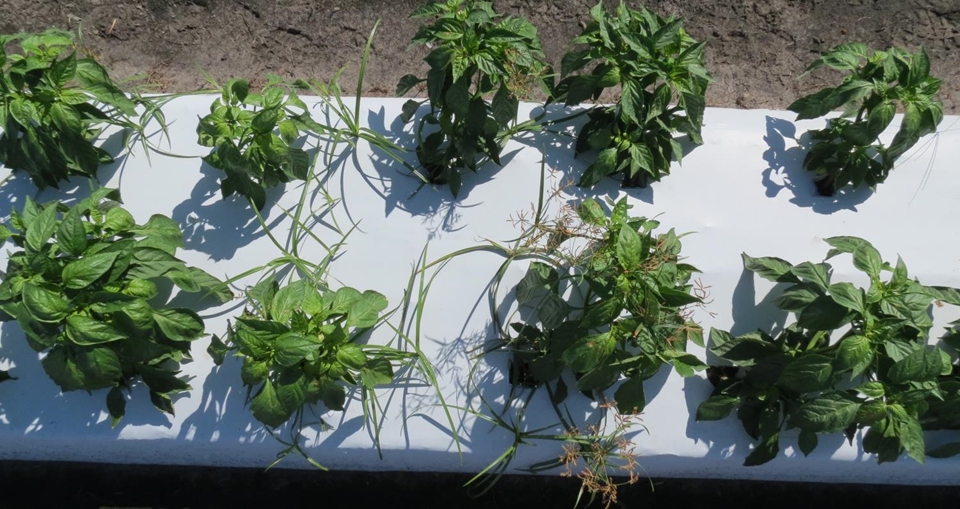By Ashley Robinson The world’s most widely used weed killer has been under review by researchers and agencies after being accused of causing cancer. Public concerns have been on the rise since 2015 when the International Agency for Research on Cancer (IARC) reclassified glyphosate, the active ingredient in Roundup, as a probable carcinogen. Roundup, the world’s most commonly used herbicide, …
Informing Consumers About Pesticides
By Ernie Neff The Florida Fertilizer and Agrichemical Association (FFAA) is taking a new approach to educating consumers about the benefits and need for pesticides. FFAA President Mary Hartney, who describes herself as “an advocate for the responsible use of pesticides and fertilizers in Florida,” discussed the approach at Florida Ag Expo in November. Hartney says many people are opposed …
UF Researchers Developing Combinations of Fumigants to Fight Nutsedge
By Karla Arboleda Researchers at the University of Florida Institute of Food and Agricultural Sciences (UF/IFAS) are developing fumigant combinations to fight nutsedge. Nathan Boyd, an associate professor of horticulture at UF/IFAS, said options are limited when trying to control the weed. “Nutsedge is a problem because it’s the only weed that punctures the plastic mulch that we use,” Boyd …
Helping Specialty Crop Growers Reduce, Remediate and Recycle Water
By Sarah A. White Water is necessary for growing plants. This simple statement says it all but doesn’t begin to address the complexities of water decisions growers face today. Some questions are common, regardless of where your operation is located: How much water do my plants need? How does water quality affect plant growth? How much water do I need …
Updating North Carolina Research Stations With New Technology
By Karla Arboleda North Carolina State University (NC State) and the North Carolina Department of Agriculture & Consumer Services are working to update research stations with new technology. Together, the two institutions will improve technology in 18 research stations across the state. Jason Ward, an assistant professor in the biological and agricultural engineering department at NC State, talked about the …
What’s New in IR-4 Research
By Karla Arboleda Inter-regional Research Project 4 (IR-4) researchers at the University of Florida (UF) recently helped to approve an herbicide for stevia. Janine Spies, the IR-4 southern region field coordinator at UF, focuses on collecting residue data in field trials for various specialty crops. In collaboration with researchers located in 13 states as north as Virginia, as west as …
Steaming for Weed Management
By Ramdas Kanissery and Yiannis Ampatzidis Weeds are a significant problem in horticultural production and must be controlled to maintain good crop yield. Concerns related to non-judicious use of herbicides, which include ground and surface water contamination and pesticide residues in food, has sparked public awareness and restrictions on herbicide use. For these reasons, alternative and integrated systems for weed …
UF/IFAS Vegetable Production Handbook Debuts at Citrus Expo
GAINESVILLE, Fla. (UF/IFAS) — Last year, the Citrus Expo event broke new ground by adding a day-long program devoted to vegetables and specialty crops, curated by experts with the University of Florida Institute of Food and Agricultural Sciences. This year, when the program returns to Citrus Expo Aug. 14-15 at the Lee County Civic Center in North Fort Myers, organizers …
Cutting Costs With Smart Sprayers
By Yiannis Ampatzidis Traditional broadcast sprayers usually treat the entire field to control pest populations, potentially resulting in unnecessary application to areas that do not require treatment. These sprayers apply agrochemicals uniformly, even though distribution of weeds is typically patchy. This results in wastage of valuable compounds, increased costs, crop damage risk, pest resistance to chemicals, environmental pollution and contamination …
Controlling Purple Nutsedge in Tomatoes
Purple nutsedge can be a tough nut to crack for many tomato growers. Nathan Boyd, weed scientist at the University of Florida’s Gulf Coast Research and Education Center (GCREC), recently completed herbicide trials examining whether pre-emergent or post-emergent herbicides work better in controlling purple nutsedge in tomatoes. The trials took place at the GCREC in Wimauma. Purple nutsedge can be …










